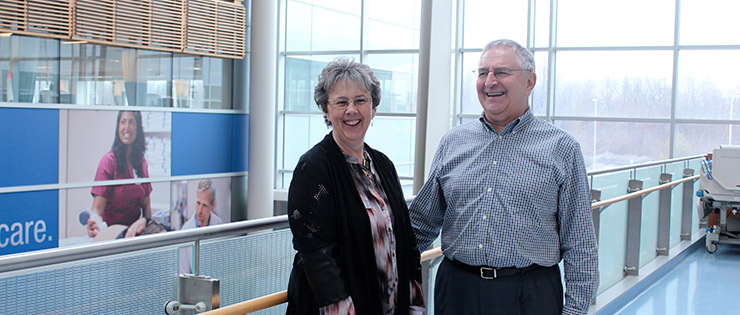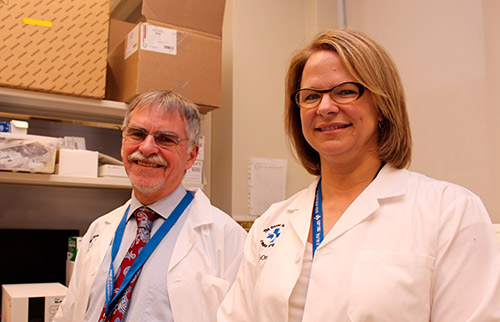
With the consent of his wife, Maureen, Charles Berniqué participated in a clinical trial at The Ottawa Hospital and survived a severe infection.
Charles Berniqué recently survived a deadly infection – septic shock – requiring prolonged intensive care.
“It is tremendous what The Ottawa Hospital did for me,” said 73-year-old Berniqué. “I was so close to death.”
Berniqué developed an infection in 2015 after his esophagus burst, possibly due to a severe case of food poisoning. This led to severe septic shock, a deadly condition that occurs when an uncontrolled infection results in hyper-activation of the immune system, causing the cardiovascular system and other organs to fail. Thoracic surgeons at The Ottawa Hospital provided fluid resuscitation, repaired his esophagus and started antibiotics. He was placed into a coma in the Intensive Care Unit (ICU), receiving medications, mechanical ventilation and dialysis to support his heart, lungs and kidneys.
Stem cells are usually thought of as the building blocks of the body – able to give rise to all our cells and organs. But a clinical trial at The Ottawa Hospital is testing the idea that certain stem cells may also be able to help control the body’s immune system to reduce injury and promote healing, while improving its ability to fight infection.
Berniqué was in the coma when his wife, Maureen, consented to his participation in the clinical trial.
“I just wanted to do whatever I could to help him,” she said.
Berniqué received an intravenous infusion of 30 million mesenchymal stem cells. He battled back and, despite a number of complications from the massive infection, he slowly recovered. After nearly three months in the hospital, he returned home to Hawkesbury, spending time with his wife, children and grandchildren, and working part-time.
The clinical trial that Berniqué participated in is the result of many years of research led by Drs. Duncan Stewart and Lauralyn McIntyre.

Dr. Lauralyn McIntyre (right) is leading the clinical trial, which is based upon years of research conducted with Dr. Duncan Stewart (left), Executive Vice-President of Research at The Ottawa Hospital and professor at the University of Ottawa.
“Our laboratory studies that showed that mesenchymal stem cell therapy tripled survival in a mouse model of septic shock,” said Dr. Stewart, Executive Vice-President of Research and senior scientist at The Ottawa Hospital, and professor at the University of Ottawa. “The cells also reduced damaging inflammation and helped the mice eliminate the bacteria.”
Dr. McIntyre, an intensive care physician and senior scientist at The Ottawa Hospital, was impressed by the results.
“Researchers around the world have spent decades trying to find a therapy that will treat the root causes of septic shock rather than just the symptoms, but so far, none of these therapies have improved survival,” said Dr. McIntyre, who is also an associate professor at the University of Ottawa. “So I was very excited to work with Dr. Stewart and his team to design and lead a clinical trial to test this experimental therapy in our patients. We don’t know whether the cell therapy played any role in Mr. Berniqué’s remarkable recovery, but the cells were very well tolerated and we are excited to continue to study this promising therapy in more patients.”
About 100,000 Canadians suffer from septic shock each year, and between 20 and 40 percent of these people do not survive. Septic shock accounts for 20 percent of all ICU admissions and costs the Canadian health-care system about $4 billion each year.
The world-first trial at The Ottawa Hospital, called Cellular Immunotherapy for Septic Shock, includes nine patients treated with increasing doses of mesenchymal stem cells. Another 21 patients previously participated as part of the control arm of the trial. The researchers expect to publish the results in 2017.
They have already received funding from the Ontario Institute for Regenerative Medicine to begin scaling up their cell bank for a larger Phase 2 trial, which will help determine if the therapy is effective.
The trial has also been funded by the Canadian Institutes of Health Research and the Stem Cell Network, with additional support from The Ottawa Hospital Foundation.

Support patient care and research at
The Ottawa Hospital


 To reset, hold the Ctrl key, then press 0.
To reset, hold the Ctrl key, then press 0.